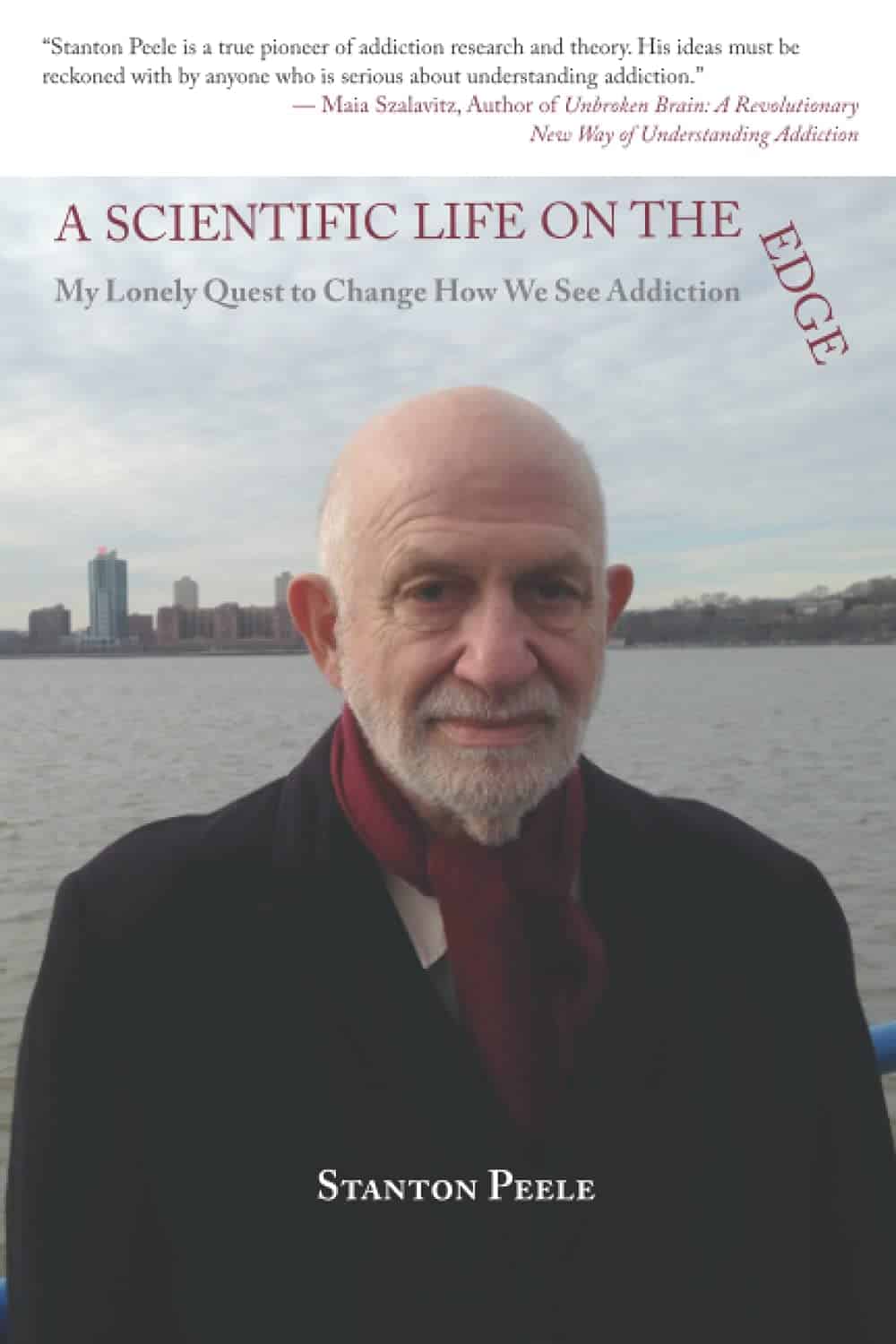Stanton Peele Book Review by Dr. Tom Horvath
A Scientific Life on the Edge: My Lonely Quest to Change How We See Addiction, by Stanton Peele, reviewed by Tom Horvath, PhD
Peele’s latest book
Peele revolutionized our understanding of addiction. Love and Addiction, published in 1975 (and co-authored with Archie Brodsky), presented a new perspective on what addiction is, how it arises, and how it can be addressed. His insights are still far from being fully understood and acted upon, especially in the U.S. As this book presents in detail, more often his ideas have been ignored or attacked. As someone said, “the first one through the wall always gets bloody.” Those interested in a fact-based approach to addictive problems are in his debt.
The book is overviewed in three places: Prologue (7 pages), Chapter 1 (“I can’t get no respect,” 10 pages), and a Conclusion (33 pages). For Peele the personal and the intellectual are well blended (as I suspect they are for anyone so immersed in a body of knowledge). However, Chapters 2, and 4-8, are primarily personal. Chapters 3, and 9-11, are primarily focused on his intellectual history (including the influence of Winick, Zinberg, and many others), and the comparison of his work with other work. For those less interested in Peele’s personal life, the overviews and intellectual autobiography chapters are well worth reading by themselves.
The prominent themes of the book include the following:
Peele is generous. He makes kind comments about many people. He is, however, also frank. If he views someone as having behaved badly, he says so. He is also entirely clear about what he disagrees with.
He wants to set the record straight. Where his work is not fully understood, even by those who are familiar with it, he offers clarification. In reviewing the current group of prominent addiction writers, he states that “all of them fail to make some essential leap” (p. 227) in their understanding of addiction. He also identifies authors who have benefited from his contributions (given what they are writing) but do not acknowledge them.
He identifies small positive changes being made in U.S. addiction treatment and the U.S. view of addiction. However, he mostly perceives substantial delay in the adoption of scientifically defensible positions. Some of this minor progress is made without acknowledging his contributions.
Stanton Peele regrets that his life has been “on the edge,” the life of an outsider, yet he also appears to accept this situation and to have been prepared for it. As he states, “my career in the addictions field is largely a string of rejections” (p. xv). Nevertheless, he continues to write and get to be read. He is hopeful that in time that his ideas will fully gain acceptance. He has also received, among other noteworthy accomplishments, the Mark Keller Award, and the Lindesmith Lifetime Achievement Award). Beyond this recognition, however, he states that “I fantasize about winning a Nobel Prize in medicine for my practical and theoretical work with addiction.” An outrageous idea? Peele adds that “economist Gary Becker did win a Nobel prize for his 1988 paper on a ‘Theory of Rational Addiction.’ One of the handful of references in his Nobel-winning article is to my book, The Meaning of Addiction” (p. xvii).
The individuals who do recognize Peele’s contribution are prominent and numerous. Many of them are quoted on the covers, inside the front cover, or in a closing section, “Afterword: Observations about Stanton Peele.”
As one summary of Peele’s comprehensive and profound contribution to our understanding of addiction—you could begin reading the book here–I suggest reviewing the 10 recommendations he made to the Drug Policy Alliance, for goals they should be encouraging society to adopt (p. 257). How long it will take us to accept these goals is for me one of the critical questions of our time.
Peele wonders about how his own personality may have contributed to his status as an outsider. He refers to himself as having a “reckless personality” (p. xiii). He quotes William White: “Stanton’s persona can dwarf his written words, leaving both his most avid supporters and rabid critics more focused on him and his most inflammatory rhetorical flourishes than the more nuanced points that can be found in his books” (p. xv). Peele immediately states that White’s statement allows the reader to “see my problem” (p. xv). He opens Part I (consisting of the first 4 chapters) with: “My mother treated me as a genius, told me to disregard those who minimized or ridiculed my ideas or person. I never lost that protective shield. I can’t be deterred.” It seems likely to me that his persistence has both helped him and hindered him.
For those who know or have read individuals he comments on, the book could appear to contain gossip. Upon reflection I think his comments are a useful addition to the historical record. (I am mentioned or quoted on a handful of pages, always in a positive or matter-of-fact manner. Perhaps I would feel differently had I been critiqued.)
Regardless of how one feels about Stanton the person, “the modern understanding of addiction and recovery begins with Love and Addiction” (so I am quoted just inside the front cover). Peele of course has debts to his predecessors–and he acknowledges them. However, he offers the first complete description of addiction that fits with our actual observations about it.
